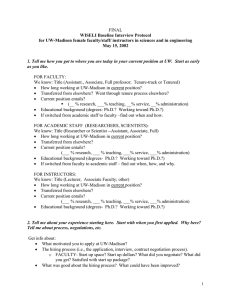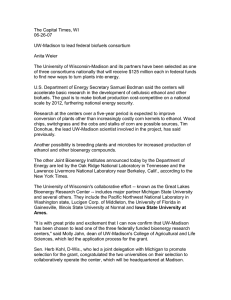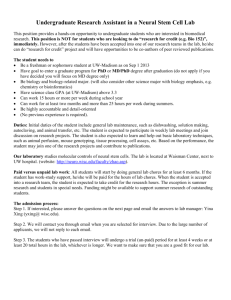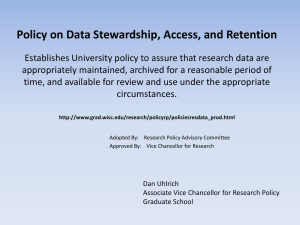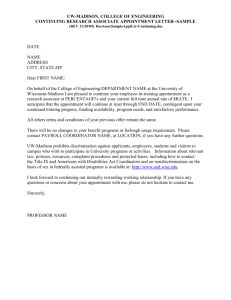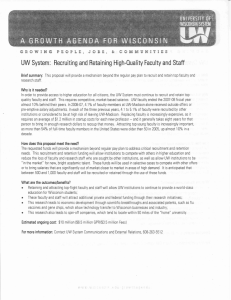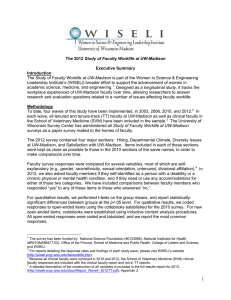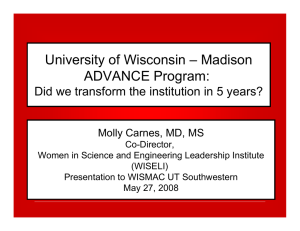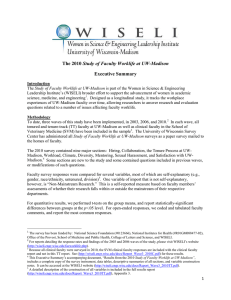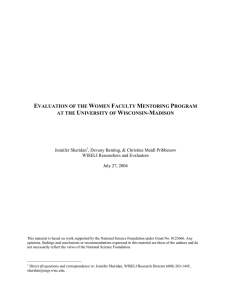1 WISELI I P - 2006 E
advertisement
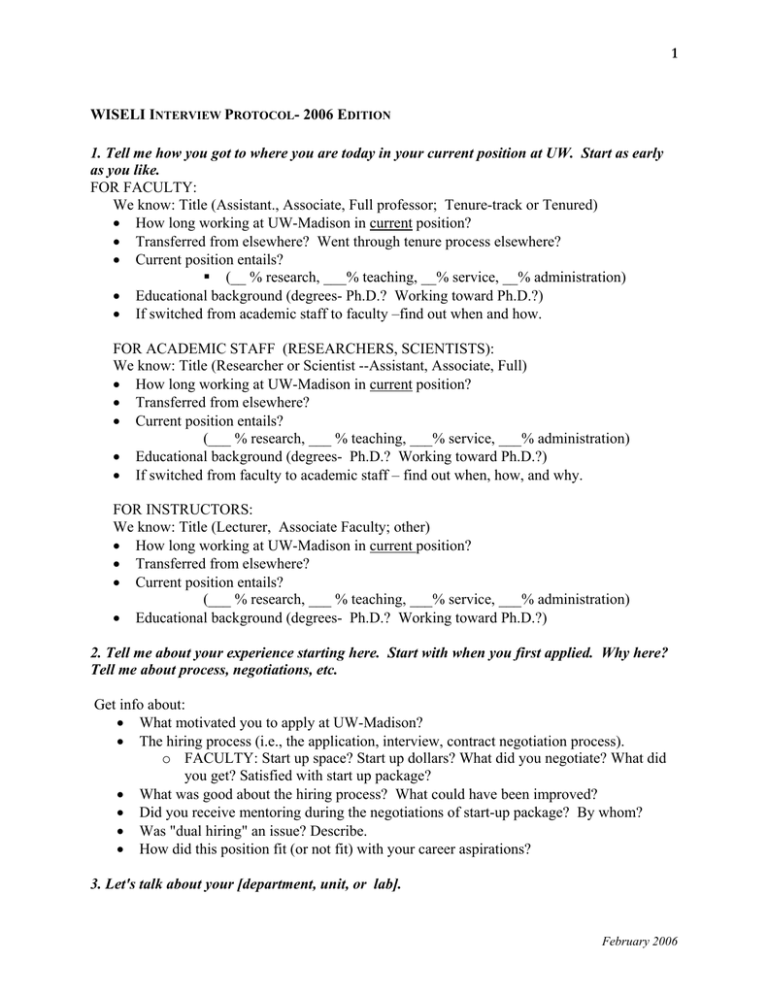
1 WISELI INTERVIEW PROTOCOL- 2006 EDITION 1. Tell me how you got to where you are today in your current position at UW. Start as early as you like. FOR FACULTY: We know: Title (Assistant., Associate, Full professor; Tenure-track or Tenured) • How long working at UW-Madison in current position? • Transferred from elsewhere? Went through tenure process elsewhere? • Current position entails? (__ % research, ___% teaching, __% service, __% administration) • Educational background (degrees- Ph.D.? Working toward Ph.D.?) • If switched from academic staff to faculty –find out when and how. FOR ACADEMIC STAFF (RESEARCHERS, SCIENTISTS): We know: Title (Researcher or Scientist --Assistant, Associate, Full) • How long working at UW-Madison in current position? • Transferred from elsewhere? • Current position entails? (___ % research, ___ % teaching, ___% service, ___% administration) • Educational background (degrees- Ph.D.? Working toward Ph.D.?) • If switched from faculty to academic staff – find out when, how, and why. FOR INSTRUCTORS: We know: Title (Lecturer, Associate Faculty; other) • How long working at UW-Madison in current position? • Transferred from elsewhere? • Current position entails? (___ % research, ___ % teaching, ___% service, ___% administration) • Educational background (degrees- Ph.D.? Working toward Ph.D.?) 2. Tell me about your experience starting here. Start with when you first applied. Why here? Tell me about process, negotiations, etc. Get info about: • What motivated you to apply at UW-Madison? • The hiring process (i.e., the application, interview, contract negotiation process). o FACULTY: Start up space? Start up dollars? What did you negotiate? What did you get? Satisfied with start up package? • What was good about the hiring process? What could have been improved? • Did you receive mentoring during the negotiations of start-up package? By whom? • Was "dual hiring" an issue? Describe. • How did this position fit (or not fit) with your career aspirations? 3. Let's talk about your [department, unit, or lab]. February 2006 2 A) Briefly describe your [department, unit, lab] for me. (How large? Geographical layout (e.g. in one location or several locations)? Diversity in terms of gender, race/ethnicity, age?) B) What’s it like to work/be in your [department, unit or lab]? We are interested “in general” and for you “personally.” Interested in resources and social environment. Examples of prompts: What is “tone” of department? (friendly, supportive, competitive, hostile) unit/lab/departmental meetings-- how do you feel about your participation in meetings with colleagues? Other collegial interactions? how committee assignments are made FACULTY/INSTRUCTOR: how teaching assignments are made resources available in the department support for advancement in your career kind of chair/director you have your colleagues and your relationships with them C) Do you or have you had a role in leadership? Describe. Do you want or plan towards a role in leadership? D) What are the best features of your work environment? E) How does working in this [department, unit, or lab] compare to other [departments, units, labs] (here and at other jobs) with respect to: o resources? o social environment? F) What are the issues that come up for you in your [department, unit or lab]? How do/did you handle these issues? EXAMPLES INTERVIEWEES MAY RAISE – Some may be used as probes if interviewee doesn’t discuss. • Amount of work demanded • Amount of resources – space, assistance • Course and service assignments • Sense of isolation or limited social interaction in workplace • Leadership by chair/director and support in your career • Colleagues to work/talk with; Respect from colleagues • Availability of mentors or role models • Having a voice in unit/department policy • Balance between work and non-work life (including child care) • Sexual harassment • Discrimination • Things that are done to make you feel valued or de-valued G) Based on issues raised by interviewee, ask: February 2006 3 • Have you used campus resources/initiatives to address these issues? [mention all] Examples: Mentoring Child care Stopping the tenure clock Family leave Extended tenure clock Academic Staff merit Committee on Women Faculty Ombudsperson Sexual Harassment Workshops/Brochures Women Faculty Mentoring Program Employee Assistance • Are there initiatives that WISELI could undertake to address these concerns? (e.g., Leadership training for chairs/deans; Professional development workshops for faculty/staff; Studies of key issues) 4. Let's talk about balancing life at work and life outside of work. A) Tell me about your commitments/interests outside of work. • Partner/spouse? • Children? Other dependents? • Dual career? Both in sciences or engineering? Primary & secondary earners? • Other commitments? • How are responsibilities shared? B) How do these commitments/interests influence your work? Examples: • Expectations about balancing career and life outside of work • Ability to attend late meetings, work nights and weekends, work in lab 24-7 • Time • Interruptions C) Does balancing work and home life/interests have an effect on your physical and mental health? If so, in what way? Would you consider this effect to be positive or negative? 5. Can I ask you to reflect on your career at UW-Madison and to think about your future? A) Tell me about how your career has evolved at UW-Madison? • Has it evolved as you expected? How happy or satisfied are you in your career? Tell me about success and your definition of success. What motivates you? • What are your short-term and long-term career goals? • What has been most influential? • Have you ever wanted or tried to leave UW-Madison? If so, what prompted you to want to leave? And, what kept you here? Did you re-negotiate space, salary, etc.? • Do you plan to stay at UW-Madison? B) Do you feel that your work has been supported/recognized at UW-Madison? February 2006 4 • If so, how has it been supported? (e.g., financial or other rewards; request for leadership roles; access to key committees; access to resources such as equipment and graduate students; research collaborators) • Are there ways that you feel your work has NOT been supported/recognized at UWMadison? 6. What role has gender played in your career and in your experience? A) In your view, did gender effect your early career aspirations, experiences, or planning? B) Does it effect your current work experience? C) What’s it like to be a woman working at UW in the [science, engineering]? • Are there challenges or obstacles that women in [science, engineering] in general encounter? • Are there challenges or obstacles that you encounter? • Many women leave the [sciences, engineering] and leave academia. What keeps you in the [sciences, engineering]? Are there factors that keep you here? D) How, if at all, do you think gender might play a role in your future professional career? E) Have you observed differences between the career choices or paths of women and those of men in [science, engineering] in your [department, unit, or lab]? If so, what are they? 7. Let's talk about some of the gender issues people raise. Discuss chart with interviewee 8. If these are experienced by you, where do you go (would you go, or did you go) to get assistance with these types of issues? What is available here? Where is more help needed? 9. What are your thoughts about the future for women in [sciences or engineering] at UW in particular? Why do you feel this way? How could WISELI fit with this future? Where should efforts be focused? This is where we’ll ask about her experience, participation in, or knowledge about WISELI initiatives: Specifically,… 10. Feel free to make any additional comments. February 2006 5 FOR QUESTION #7: The literature on women in science and engineering describes possible differences experienced by men and women in academic science and engineering careers. Here is a list of possible differences. Can you let us know: • Have you have experienced any of these differences? (describe, if you have) • Have you observed any differences experienced by other women in [science or engineering]? • In your view, are some of these more serious/critical than others? Differences in… Experienced Observed Considered by by most/more interviewee interviewee critical Allocation of teaching/service assignments (e.g., committees) Access to resources (lab or office space) Salary (although similar rank, title, experience, publications) Value/respect by colleagues Degree to which taken seriously as scholar/scientist/engineer Attitudes or consequences if one needs to meet family responsibilities, uses family leave, stops tenure clock, or attempts to job share Processes or standards for promotion Inclusion into professional collegial relationships Access to senior faculty Opportunities to show leadership Value given to informal service activities (e.g., community involvement) Negotiating salary when about to go elsewhere Involvement with colleagues in informal activities Interactional/conversational styles The experience of having your ideas ignored Feelings of professional or social isolation Feelings of being undervalued or ignored by colleagues Sexual harassment General happiness/mental health Physical health February 2006
